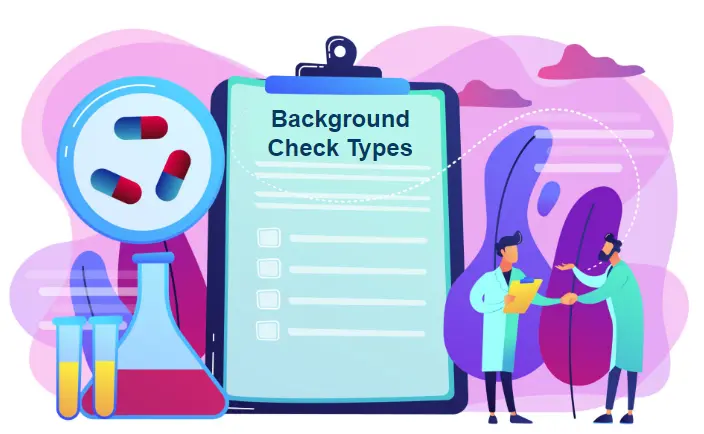9 Different Types of Background Checks For Employment

Hiring the right talent is important, but it doesn’t come cheap—on average, filling a single position costs $4,700, and this figure can soar to three or four times the salary for the role.
For businesses, a bad hire can lead to wasted resources, productivity loss, and potential risks to company reputation. This is why more employers are turning to comprehensive background checks to identify red flags early in the pre and post hiring process,make well-informed decisions and reduce hiring risks.
In this guide, we’ll uncover the types of background checks, their importance, and how they can streamline your hiring process. For a more efficient approach to conducting background checks, consider a Background check with AI.
What is a Background Check?
A background check aims to provide a complete profile of an individual through background screening. Conducting a background check involves reviewing an applicant's criminal history, employment records, and personal details to assess their suitability for the position.
By gathering comprehensive information, employers can make better-informed decisions regarding potential hires and the duration of a background check varies, requiring 3 to 10 business days or longer for international cases.
Red flags on background check, such as criminal convictions, inconsistent information, or negative references, can indicate potential risks, while pending charges may also surface depending on jurisdiction.
For more insights on hiring practices, check out the guide on Screening Potential Employees.
What Background Check Do Employers Use?
Background checks may involve examining some or all of the following aspects for job applicants: verifying identity, conducting a criminal background check, obtaining a credit report, verifying education, certifications, and credentials, reviewing motor vehicle records, E-Verify confirmation, and performing fingerprint checks with the FBI.
These background checks, along with any additional screenings relevant to the role, enable employers to make informed, hiring decisions and mitigate risks associated with potential hires.
Types of Background Checks

1. Identity Verification
Identity verification ensures that the applicant is who they claim to be. This process typically involves checking government-issued identification documents and may include cross-referencing information against public databases.
Identity theft is a growing concern, with the Bureau of Justice Statistics reporting that 9% of American adults were victims of identity theft in 2021, leading to over $16.4 billion in losses. To combat this, employers and hiring managers must verify that candidates are not using stolen identities.
Identity verification background checks help ensure that applicants are who they claim to be, providing reliable checks that confirm details such as name, address, Social Security Number (SSN), date of birth, fraud alerts, and deceased person alerts.
While some applicants may falsify their identity, others may exaggerate their job history or provide fake references, so conducting background checks is essential to avoid these risks.
2. Social Media Background Check
A social media background check involves reviewing publicly available information from various social platforms to analyze candidate's behavior, values, and red flags. This check offers insights beyond traditional methods and social media analyst helps employers make well-rounded hiring decisions.
Employers use social media screenings to detect inappropriate behaviors such as hate speech or online bullying. Even if such behavior occurs on personal accounts, it can damage the company’s reputation and lead to public relations challenges. Additionally, negative online conduct can signal that the candidate may engage in workplace harassment.
For instance, sharing racist, homophobic, or sexist comments online could suggest that the candidate's values do not align with the company’s culture, potentially making other employees feel unsafe in the workplace.
Social media background checks have become an important part of pre-employment screening. These checks involve reviewing a candidate's social media profiles and online activity to to analyze behavior and identify any red flags.
3. Credit Background Checks
Credit background checks examine an applicant's credit history, including outstanding debts, payment history, and overall financial behavior. This information can be crucial for positions that require financial responsibility.
Pre-employment credit checks are essential for evaluating potential risks, especially when hiring for financial positions or roles that involve handling sensitive information. These checks typically include details such as SSN verification, recent credit applications, credit history, debt levels, bankruptcies, and previous employment history.
Positions requiring financial responsibility or security clearance often require credit reports. ShareAble for Hires provides credit reports powered by TransUnion, a reputable credit agency with nearly 40 years of experience, ensuring clear and detailed results after obtaining candidate consent.
Pro Tip: Not all background check providers offer the same level of service, so it’s important to choose one that delivers accurate, transparent, and reliable results.
4. MVR Reports
Motor Vehicle Records (MVR) checks are particularly relevant for jobs that involve driving. These checks provide information about an individual's driving history, including any traffic violations, license suspensions, or accidents.
5. Criminal Background Checks
A criminal background check may explore national, federal, state, or county criminal databases to identify whether a person has a history of misdemeanor or felony criminal convictions or pending criminal cases.
Employers utilize these checks to assess any past criminal activity that might affect an individual's job performance or workplace safety.
For employers filling roles that involve sensitive financial information, security responsibilities, or access to vulnerable populations (e.g., children or elderly), criminal background checks are essential. Conducting a criminal background check online can help mitigate unnecessary hiring risks. These checks typically include:
- County, state, and federal criminal records
- FBI’s Most Wanted
- National Sex Offender Public Registry
ShareAble for Hires scours millions of records to uncover potential matches. Understanding a candidate's criminal history can guide employers in making well-informed decisions.
Note: Always consult with legal counsel to ensure compliance with local regulations regarding criminal background checks.
6. Fingerprint Background Checks
Fingerprint-based background checks are critical for roles involving security clearances or handling sensitive company or customer information. The FBI’s Integrated Automated Fingerprint Identification System (IAFIS) houses over 70 million criminal profiles, making it a highly effective tool for ensuring accurate identification.
Fingerprint checks typically provide:
- Criminal arrest dates
- Charges and case results
- Police reports linked to fingerprints
These checks are essential for employers looking to maintain a secure work environment, particularly when hiring for high-security positions.
7. E-Verify Checks
E-Verify is a web-based system that allows employers to confirm whether an employee is legally authorized to work in the United States. This system cross-references an employee’s information from the I-9 Form with records from the Department of Homeland Security (DHS) and the Social Security Administration (SSA).
E-Verify results can include:
- Employment Authorized: The information matches records, and the employee is cleared to work in the U.S.
- Tentative Non-confirmation (TNC): The information doesn’t match; the employee can contest this result.
- Final Non-confirmation: The employee is not authorized to work.
It’s important to note that a TNC doesn’t automatically mean the employee is unauthorized—it simply means a mismatch occurred and can be resolved by the employee contacting the relevant agencies.
8. Professional License Background Checks
For certain professions, verifying licenses and certifications is essential. Professional license checks confirm that the applicant possesses the required credentials to perform their job, ensuring compliance with industry standards.
Verifying professional licenses and educational qualifications is essential for roles that require specific credentials, such as plumbers, professors, teachers, fitness instructors, and senior positions that demand advanced degrees. This process ensures candidates have the necessary qualifications by validating details like degrees earned, institutions attended, years of attendance, and specialized certifications.
Education checks help employers avoid hiring individuals who may have exaggerated or falsified their qualifications. However, it's important to note that third-party verification can sometimes take several weeks to complete, which may delay the pre hiring process but ensures the accuracy and authenticity of the candidate’s credentials.
9. Education Verification
Education verification checks confirm the educational background of an applicant. This process typically involves contacting schools or universities to verify degrees, diplomas, and other credentials claimed by the applicant.
Benefits of Pre-Employment Background Checks

Conducting thorough pre-employment background checks offers numerous advantages for employers, including:
- Reduces Hiring Risks: Ensures candidates have the necessary qualifications and backgrounds, minimizing the chance of making a poor hire.
- Enhances Workplace Safety: Identifies individuals who may pose a risk to the safety and security of the workplace.
- Protects Company Reputation: By hiring qualified individuals, companies can maintain a positive reputation in their industry.
- Improves Employee Retention: Employees are more likely to remain with the company when they are well-suited for their roles.
- Ensures Compliance with Regulations: Helps companies adhere to legal requirements regarding employee hiring.
- Validates Qualifications: Confirms that applicants possess the skills and experience they claim to have.
- Reduces Liability: Protects the company from potential lawsuits resulting from negligent hiring practices.
- Enhances Hiring Efficiency: Streamlines the hiring process, allowing companies to fill positions faster.
- Promotes a Culture of Transparency: Builds trust with employees by demonstrating that the company values honesty and integrity.
- Strengthens Team Dynamics: Ensures a cohesive work environment by hiring individuals who fit well with the existing team.
Why Employers Should Conduct Background Checks
Employers should prioritize background checks to ensure that they are making informed hiring decisions.
By verifying an applicant's history, employers can significantly reduce the risks associated with hiring, enhance workplace safety, and protect their organization's reputation.
Ultimately, conducting background checks leads to a more competent and trustworthy workforce.
Ferretly Will Help You Conduct Your Background Check
For an efficient and effective way to conduct your background checks, explore the benefits of a Background check with AI. Leveraging advanced technology can help you streamline the screening process and make more informed hiring decisions.
Background Check Types - Frequently Asked Questions
1. What does a background check consist of?
A background check consists of various checks, including criminal history, credit reports, employment verification, and identity checks. Each component provides insights into the applicant's history and qualifications.
2. Why Is It Important to Conduct Pre-Employment Screening for Drug Use?
Pre-employment screening for drug use is important as it ensures a safe and productive work environment. Identifying potential substance abuse issues can help employers avoid hiring individuals who may compromise workplace safety and efficiency.
3. What is the Difference Between Reference Check and Background Check?
A reference check involves contacting individuals who can speak to the candidate's character and work ethic, while a background check verifies factual information about an applicant's history, such as criminal records and employment history.
4. How is a Credit Background Check Done?
A credit background check is performed by obtaining an individual's credit report from a credit reporting agency. This report details the applicant's credit history, including outstanding debts and payment behaviors.
5. Why Should Social Media Checks Be Handled with Caution?
Social media checks should be conducted carefully, as they can involve sensitive personal information. Employers must be mindful of privacy concerns and ensure they do not discriminate based on irrelevant or personal factors found in social media profiles.






